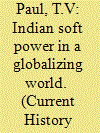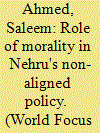|
|
|
Sort Order |
|
|
|
Items / Page
|
|
|
|
|
|
|
| Srl | Item |
| 1 |
ID:
129653


|
|
|
|
|
| Publication |
2014.
|
| Summary/Abstract |
Soft power-based on intangible indicators such as culture, civilization, literature, philosophy, involvement in global institutions, diplomacy, political organization, and state capacity-has emerged as an important factor in the globalizing world for nations seeking higher status and influence. But an appraisal of India's present and putative soft power assets underscores the need for greater hard power resources in order to harness soft power more effectively. Indeed, soft power without hard power is a chimera, and they should not be seen in oppositional terms, especially for an aspiring global power. Hard power sources include military, economic, demographic, and technological assets. As defined by Harvard's Joseph S. Nye Jr. in his 2004 book Soft Power: The Means to Success in World Politics, soft power "is the ability to get what you want through attraction rather than coercion or payments. It arises from the attractiveness of a country's culture, political ideals, and policies. When our policies are seen as legitimate in the eyes of others, our soft power is enhanced." Yet a country relying solely on soft power without hard power assets can find its weaknesses exposed easily. This happened to India in 1962, when China inflicted a humiliating military defeat on it, tarnishing New Delhi's hard-won soft power position in the world, especially among other de.
|
|
|
|
|
|
|
|
|
|
|
|
|
|
|
|
| 2 |
ID:
130824


|
|
|
|
|
| Publication |
2014.
|
| Summary/Abstract |
Basis of India's Foreign Policy
India has the heritage of an ancient civilization and culture, and its foreign policy formulated after independence which reflected its rich culture and intellectual political tradition. Indian foreign policy makers had before them the teachings of Kautilya, the realist. who had recognized war as an important instrument of power in foreign policy. At the same time, they were also impressed by the Buddhist traditions of Ashoka, the Great, who advocated peace, freedom, morality and equality. Nehru chose Ashoka's tradition and incorporated the ideals of international peace, and paci?c settlement of international disputes. lndia's foreign policy largely determined in accordance with the ideals of our freedom struggle, Gandhian philosophy of non violence and the fundamental principle of Indian tradition of Vasudhaiva Kutumbkam (means the World as one family). Nehru's personality has had a direct impact on lndia's foreign policy which is largely based on her history and culture. Speaking in Lok Sabha in March 1950, he argues that, 'it should not be supposed that we are starting on a clean slate. It is a policy which flowed from our recent history and from our national movement and its development and from various ideals we have proclaimed.
|
|
|
|
|
|
|
|
|
|
|
|
|
|
|
|
|
|
|
|
|